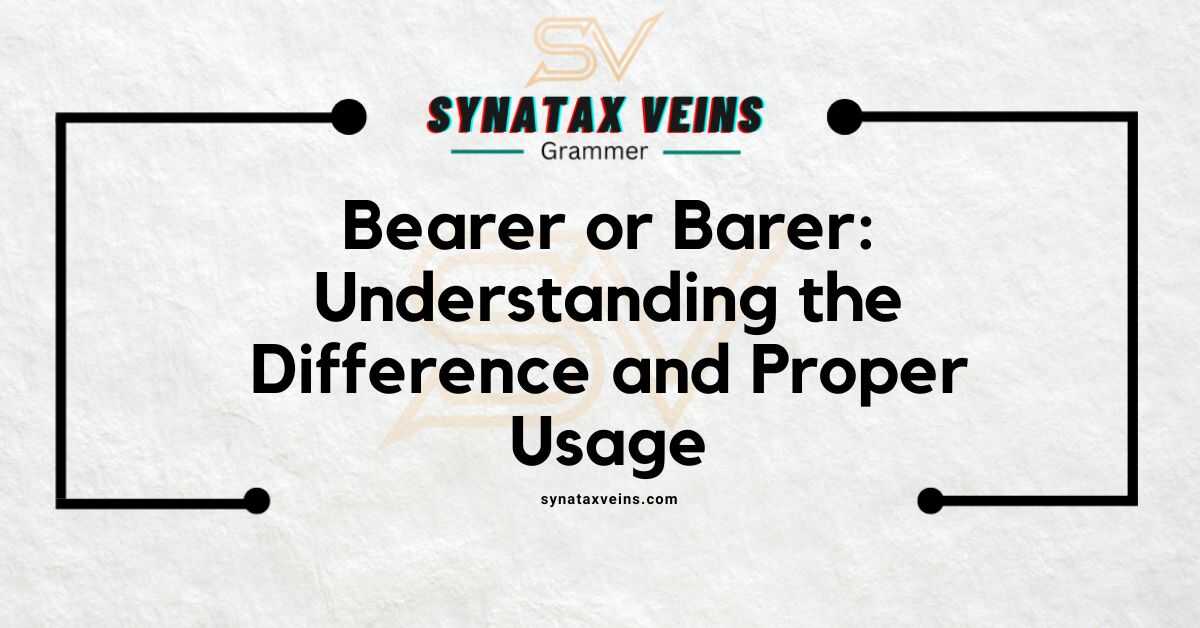Many people confuse bearer or barer because they sound the same. However, they have different meanings and uses. Choosing the right word is essential for proper grammar, especially in formal writing. This guide will explain the bearer vs barer difference, provide examples, and help you avoid common mistakes.
What Does “Bearer” Mean?
The meaning of bearer is someone who carries, delivers, or holds something. This word is commonly used in legal, financial, and ceremonial contexts.
Key Definitions of “Bearer”
- A person who carries something – Example: The bearer of a message brought important news.
- A financial term – Used in bonds and securities (e.g., bearer bond holder).
- A role in ceremonies – Example: A ring bearer carries the wedding rings.
- A symbolic term – Example: A flag bearer represents a country or team.
| Usage | Example |
|---|---|
| Messenger | The news bearer arrived. |
| Finance | He is a bearer bond holder. |
| Ceremony | The ring bearer looked nervous. |
What Does “Barer” Mean?
The meaning of barer is the comparative form of bare. It describes something that has less covering or is more exposed.
Key Definitions of “Barer”
- More exposed than before – Example: After the storm, the trees were barer than before.
- Lacking decoration – Example: The walls looked barer after removing the paintings.
- Comparative adjective – It compares two things, meaning one is more bare than the other.
| Usage | Example |
| Comparison | The mountain looked barer than before. |
| Minimalism | The room became barer after the sale. |
| Exposure | His head felt barer after the haircut. |
Key Differences Between Bearer and Barer
| Bearer | Barer |
| A noun – Refers to a person or thing that carries something. | An adjective – Describes something more exposed. |
| Common in finance, law, and messages. | Used for comparisons (more bare than something else). |
| Example: The bearer of the news arrived. | Example: The old house looked barer than before. |
Examples of “Bearer” in Sentences
- The bearer of a message delivered urgent news.
- In finance, a bearer bond does not require a registered owner.
- The ring bearer was a five-year-old boy at the wedding.
- She was the bearer of good news.
- The flag bearer led the parade with pride.
Examples of “Barer” in Sentences
- The room looked barer than before after the furniture was removed.
- His bookshelf became barer when he donated some books.
- After the storm, the trees were barer than ever.
- The walls became barer when she took down the paintings.
- His head felt barer after the haircut.
Side-by-Side Comparison
Understanding the bearer vs. barer difference becomes easier when you see them side by side. The table below highlights their meanings, grammar usage, and common errors to help clarify their roles in sentences.
| Word | Meaning | Usage | Examples |
|---|---|---|---|
| Bearer | Someone who carries or delivers something. Can also refer to financial terms like bearer bond holder or legal holder of documents. | Often used in formal contexts, finance, and legal settings. | “The bearer of the flag led the parade.” / “He is the bearer of important news.” / “Bearer bonds are unregistered securities.” |
| Barer | The comparative form of “bare”, meaning more exposed, uncovered, or minimal. | Commonly used in descriptive writing to compare two things. | “The trees in winter are barer than in autumn.” / “Her desk is barer than mine.” / “After the storm, the land looked even barer than before.” |
Everyday Usage Examples
Both words appear in different language structures, and using them incorrectly can lead to writing issues. Below are examples of how they fit into daily conversations and proper grammar usage.
- “The news bearer arrived with an urgent message.” (Correct)
- “She mistakenly thought ‘barer’ meant someone who delivers something.” (Incorrect)
- “His bookshelf looked barer after donating half of his books.” (Correct)
- “The company assigned a bearer to handle confidential documents.” (Correct)
Bearer in Sentences
Seeing bearer in sentences can help solidify its meaning. This word is often linked to legal, financial, and formal settings, making it important in grammar rules and language accuracy.
- “The bearer of the letter must deliver it to the king.”
- “A bearer bond allows the holder to claim its value without registration.”
- “She was the bearer of bad news, informing the team of the budget cuts.”
- “The ring bearer played an important role at the wedding.”
Barer in Sentences
Since barer is the comparative form of bare, it describes something with less covering or exposure. The sentences below demonstrate how to use it properly in English usage.
- “His apartment became barer after selling his furniture.”
- “The garden looked barer in winter than in summer.”
- “The walls were barer after the paintings were removed.”
- “Her honesty made her feel barer in front of the crowd.”
By understanding the word usage and common errors, you can improve your writing clarity and avoid confusion between bearer and barer.
Bearer of Bad News or Barer?
A bearer is someone who carries or delivers something. When someone is called a bearer of bad news, it means they are bringing unfortunate or unpleasant information. This phrase is commonly used in everyday conversations, literature, and journalism.
Using “barer of bad news” would be incorrect because barer is the comparative form of bare, meaning more exposed or uncovered. It does not relate to delivering information.
Example Sentences:
✔ Correct: I hate to be the bearer of bad news, but the project deadline has been moved up.
❌ Incorrect: I hate to be the barer of bad news, but the project deadline has been moved up.
This is a common grammar mistake, so always remember: “bearer” means someone carrying something, while “barer” means more exposed.
Common Mistakes When Using Bearer’s or Barer
Many people confuse “bearer” and “barer” because they sound similar, but they have very different meanings. This confusion often leads to grammar mistakes in writing.
Misusing these words can change the meaning of a sentence, making it unclear or incorrect. To write correctly, it’s important to understand when to use each term. Below are some common mistakes people make when using “bearer” and “barer” and how to avoid them.
1. Using “Barer” When “Bearer” Is Correct
Incorrect: She was the barer of bad news. ❌
Correct: She was the bearer of bad news. ✅
2. Misusing “Bearer” in Informal Contexts
Incorrect: I am the bearer of coffee every morning. ❌
Correct: I bring coffee every morning. ✅
3. Incorrect Spelling
- “Barer” is not “bearer.”
- “Bearer” is not “barer.”
How to Remember the Difference Between Bearer or Barer
Confusing “bearer” and “barer” is common because they sound alike, but their meanings are very different. “Bearer” refers to someone who carries something, like a bearer of a message or a bearer bond holder in finance.
“Barer” is the comparative form of “bare,” meaning more exposed or uncovered, like “barer than before.” To avoid mistakes, it’s helpful to use grammar tips and memory tricks. Below are some simple ways to remember the bearer vs. barer difference and use them correctly in writing.
- Bearer = Someone who carries something. (Think: Message bearer, financial bearer, flag bearer.)
- Barer = More bare than before. (Think: Comparative form of bare.)
- Mnemonic: “The bearer carries, while the barer is more bare.”
| Word | Trick to Remember |
| Bearer | Think “carrier” (message bearer, bearer bond, ring bearer). |
| Barer | Think “more bare” (barer than before, barer wall). |
Frequently Asked Questions
Is it barer or bearer?
It depends on the context. Bearer refers to someone who carries or delivers something, such as a bearer of a message or a bearer bond holder in finance. Barer is the comparative form of bare, meaning more exposed or uncovered.
What is the definition of a bearer?
A bearer is a person who carries or holds something. It is often used in legal, financial, and formal contexts, such as in bearer bonds, ring bearer at weddings, or flag bearer in ceremonies.
Is it barer or bearer of bad news?
The correct phrase is “bearer of bad news.” A bearer is someone who delivers something, including messages or news. Saying “barer of bad news” would be incorrect because “barer” refers to something being more exposed, not someone delivering information.
What does “or bearer” mean?
The phrase “or bearer” is commonly seen on financial documents like checks or bearer bonds. It means that the document can be claimed by whoever holds it, rather than being restricted to a specific person.
What is berer?
“Berer” is a misspelling of either “barer” or “bearer.” If you mean someone who carries something, the correct word is bearer. If you mean something more exposed, the correct word is barer.
What is order or bearer?
“Order or bearer” is a phrase used in finance and banking. It refers to a financial instrument, such as a check, that can either be transferred to a specific person (order) or to whoever holds it (bearer). Bearer instruments allow easy transferability without needing to be registered to a specific owner.
Conclusion
Understanding the bearer vs barer difference is important for writing correctly. Bearer is a noun for someone who carries something, while barer is an adjective meaning “more bare.” Avoid grammar mistakes by remembering these grammar rules and using word comparison strategies.
If you ever get confused, think of bearer in finance, bearer bond holder, or a bearer of a message, while “barer” simply means something is less covered or more exposed.

